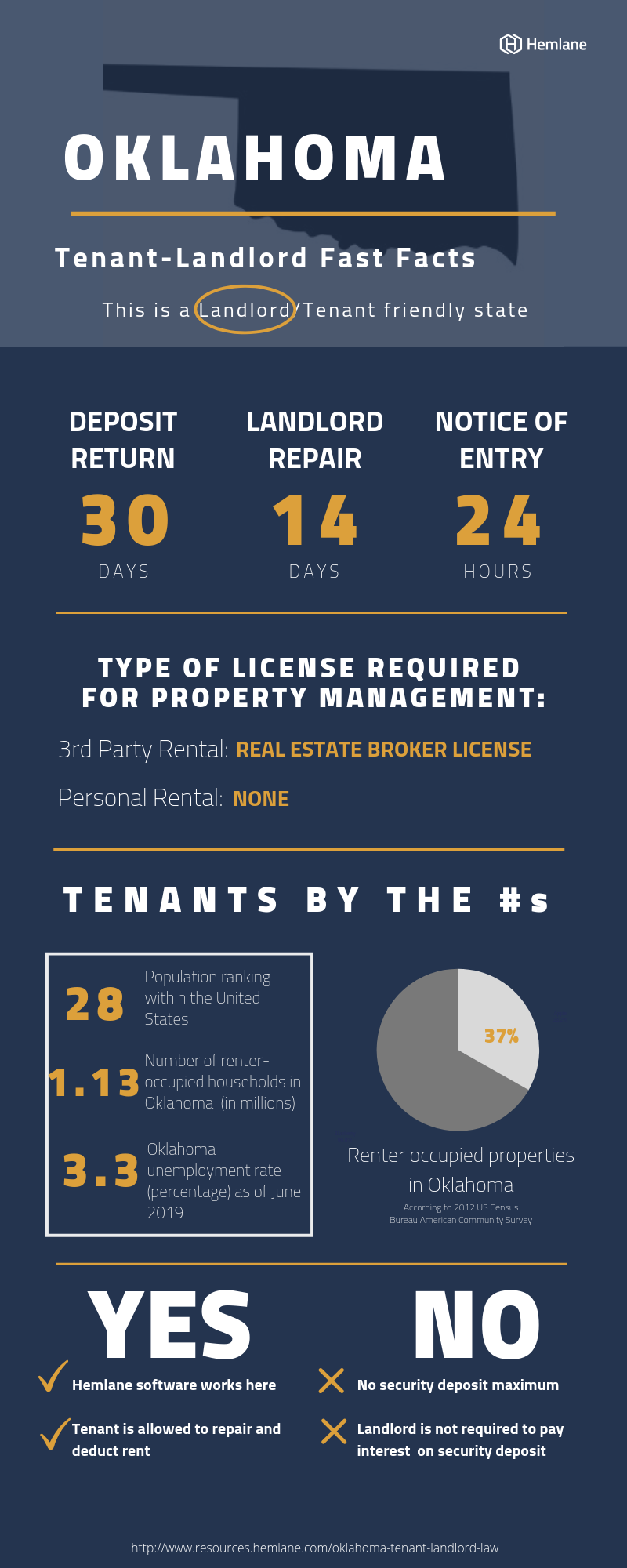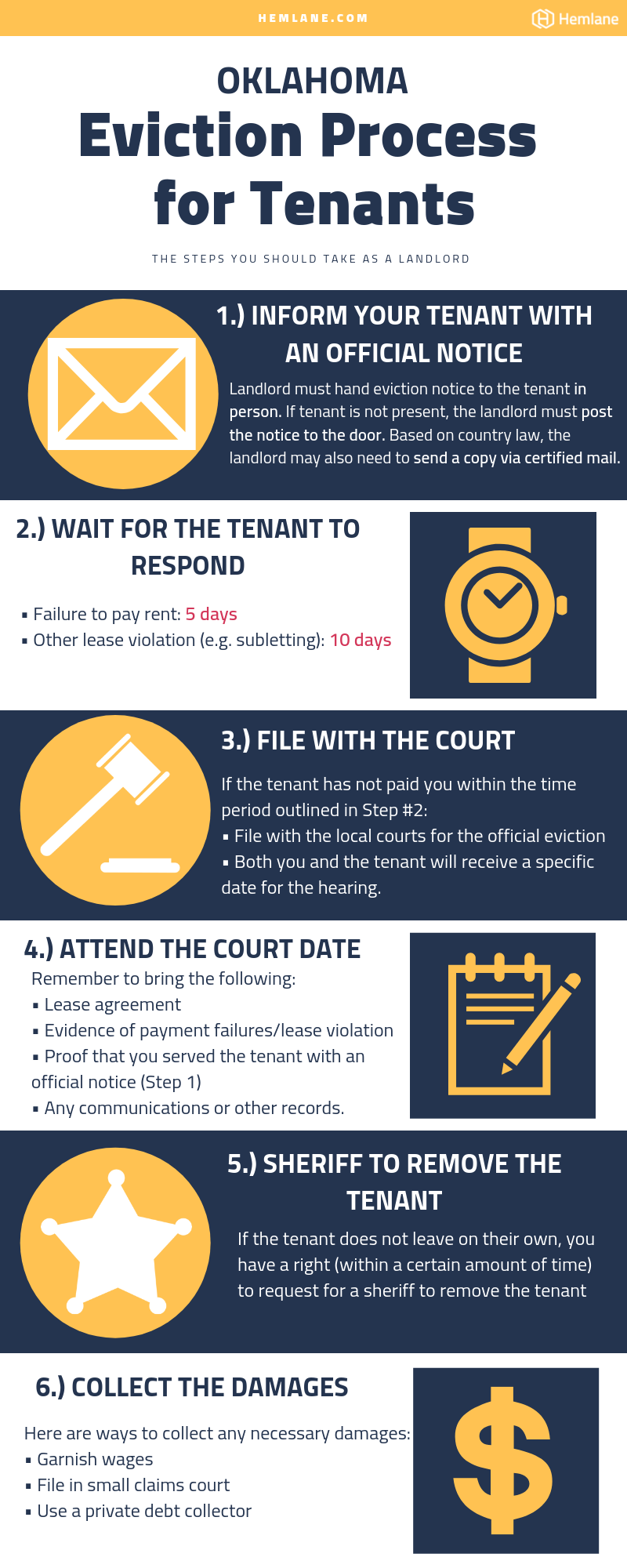Oklahoma Tenant Landlord Law

Security Deposits
-
Maximum Landlord Can Charge: There is no statute.
-
Security Deposit Interest: There is no interest required (O.S. § 115(B)).
-
Record of Deposit Withholdings: There is no statute.
-
Deadline for Returning Security Deposit: Landlords are required to return the security deposit within 30 days of the termination of a tenancy. Tenants must submit a request that the deposit be returned within six months of move-out; otherwise it remains with the landlord (O.S. § 115(B)).
-
Security Deposit Deduction Notice Upon Move Out: A written description and itemized list of damages and related charges must be submitted to the tenant following the end of the lease period, either in person or by mail (O.S. § 115(B)).
-
Bank Account Requirements: Landlords are required to keep the security deposit in an escrow account, which will be maintained by an Oklahoma federally insured financial institution (O.S. § 115(A)).
-
Permitted Use of Security Deposit: Following the end of a tenancy, landlords may only use the security deposit to compensate for rent due and damages attributed to the tenants’ noncompliance with the lease (O.S. § 115(B)).
-
Failure to Comply: If the security deposit is used for any reason other than those permitted in O.S. § 115(B), then a landlord is liable for up to six months in jail (O.S. § 115(A)).
Rent and Late Fees
-
Rent Fee: The rent is to be paid as agreed upon in the rental agreement (O.S. § 109(B)).
-
Rent Increase: There is no statute; it should be stated in the lease agreement.
-
Late Fees: There is no statute.
-
Withholding Rent: Once a tenant has provided a written notice of the Landlord’s neglect of essential duties, the tenant is permitted to acquire the essential services during the period of noncompliance. The tenant may then subtract the actual costs from the subsequent rent (O.S. § 121).
-
Repair and Deduct Rent: In health-threatening conditions, the tenant may deliver a written notice to the landlord of a need for repairs up to $100. If the landlord has not made the repairs within 14 days or sooner in the case of an emergency, then the tenant can make and submit an itemization of the repairs and deduct the actual costs from the rent (O.S. § 121(B)).
Notices and Entry
-
Landlord Access to Property: A notice of at least 1 day is required before the landlord may enter the tenant’s unit. Entry is only permitted at reasonable times. In the case of an emergency, no notice is required (41 O.S. § 128(B) and (C)).
-
Notice of Entry With Extended Tenant Absence: The landlord may not enter a property without a tenant’s consent, unless the tenant has abandoned or surrendered the property (41 O.S. § 128(D)).
-
Notice to Terminate Lease - Fixed End Date: There is no notice required. The lease will expire as stated in the rental agreement (41 O.S. § 111(C)).
-
Notice to Terminate Month-to-Month Lease: To terminate a monthly lease, the landlord or tenant must submit a written notice at least 30 days before the effective date of termination (41 O.S. § 111(A)).
-
Notice to Terminate Week-to-Week Lease: To terminate a weekly lease or anything less than 1 month, a written notice of at least 7 days is required. (41 O.S. § 111(B)).
Disclosures
Duties of Landlord:
- Repairs: Landlords are required to make all necessary repairs to ensure habitable conditions, unless fault for the conditions necessitating repairs is attributed to a tenant’s lack of reasonable care (41 O.S. § 118(A)(2))
- Common Areas: Landlords are required to keep the common areas of their properties in clean, safe and sanitary conditions, except in single-family residences (41 O.S. § 118(A)(1))
- Water and Heat: Landlords must ensure that tenants have access to working heat and water provisions that continually provide a suitable amount of each, unless it the unit is for a single family or independently metered (41 O.S. § 118(A)(5))
- Maintenance: Landlords must maintain all facilities and appliances required by the lease agreement, including electricity, plumbing, ventilation, heat, air-conditioning, elevators (41 O.S. § 118(A)(3)).
- Garbage: Landlords must provide and sustain services for garbage and waste disposal in multiple housing units, but not in single or two-family properties or those provided by the government (41 O.S. § 118(A)(4))
Duties of Tenant:
- Compliance: Tenants must “comply with all covenants, rules and regulations and the like which are in accordance with Section 126” of Oklahoma’s Statues (41 O.S. § 127(7)).
- Garbage: Tenants must dispose of their waste in a clean and sanitary manner (41 O.S. § 127(2)).
- Plumbing: Tenants must keep the plumbing appliances as clean and sanitary as the condition of the premises permits (41 O.S. § 127(3)).
- Sanitation: Tenants must keep their space as safe, clean and sanitary as the condition of the premises permits (41 O.S. § 127(1)).
- Appliances: Tenants must use all appliances and facilities in a safe and nondestructive manner (41 O.S. § 127(4)).
- Damages: Tenants should not deliberately damage or destroy the property or allow any person or animal to do so (41 O.S. § 127(5)).
- Lawful Behavior: Tenants should not engage in illegal activity that jeopardizes the health, safety, or peaceful enjoyment of the premises. This includes drug-related activity on or near the property (41 O.S. § 127(8)).
- Quiet Enjoyment: Tenants should not behave nor allow any person or animal to behave in such a manner that disturbs the “quiet and peaceful enjoyment” of other tenants on their properties (41 O.S. § 127(6))
Retaliation: There is no statute.
Lead Disclosure: Landlords must inform tenants of lead paint hazards and provide with the lease an information pamphlet on these hazards.
Eviction Laws

-
Immediate Termination of Lease: Tenants that violate the lease or legal duties of the tenant are subject to immediate termination of the rental agreement, if the breach poses a threat to the property or any other persons and is not fixed upon being notified. In the event that the tenant engages in any drug or other illegal activity that threatens the health, safety and peaceful enjoyment of the property, the landlord also has cause for immediate termination of the lease (41 O.S. § 132(C) and (D)).
-
Notice of Termination - Nonpayment: If a tenant neglects to pay rent within 5 days of receiving a written notice from the landlord, the landlord has cause to terminate the lease. The landlord may file for recovery of the rent before or after the notice is filed (41 O.S. § 131).
-
Notice of Termination - Lease Violation: Landlords are required to submit a written notice of at least 15 days to terminate a lease on the grounds of a lease violation or noncompliance with legal duties of the tenant. Tenants have a 10-day remedy period before termination may ensue (41 O.S. § 132(B))
For more information on Landlord Tenant laws please visit their website here.
As the situation with COVID-19 continues to evolve, the moratorium on foreclosures and evictions will continue to impact millions of rental properties across the country. For the most up to date information on this legislation, as well as to see if your city or county has additional directives in place, please contact your local representative.



